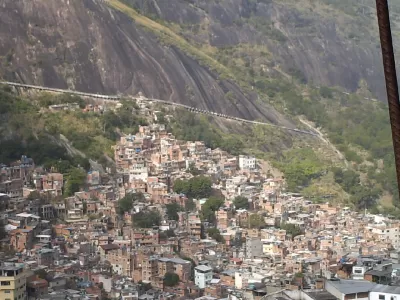The sky gondola system built prior to the Rio Olympics has ground to a halt, leaving residents of the city's favelas with little to show for such a grand investment in infrastructure.

The multi-million dollar sky gondola system built as part of the massive investment in new infrastructure for the 2016 Rio de Janeiro Olympic games has stopped operating. The project was originally seen as a boon to the favelas which it travelled over, bringing tourists and investment into the city's poorest communities. Clare Richardson reports in DW.comthat the gondolas fell victim to Brazil's continuing financial troubles.
Many had hoped the Olympic Games would serve as an impetus for Rio to narrow the vast divide between Brazil's ultra-rich and poor by providing informal communities with badly-needed infrastructure. Yet instead of instating or upgrading such services in Complexo do Alemao, Rio removed more than 2,000 residents from their homes to make way for the cable car's construction. [Local activist Thaina de Medeiros] says its route bypasses many major residential areas, suggesting the project was never truly intended to serve the community.
The closure of the gondola system is another blow to the favelas, which have seen an uptick in crime that has helped drive away tourists.
FULL STORY: Rio hits the brakes on controversial favela cable car

Alabama: Trump Terminates Settlements for Black Communities Harmed By Raw Sewage
Trump deemed the landmark civil rights agreement “illegal DEI and environmental justice policy.”

Planetizen Federal Action Tracker
A weekly monitor of how Trump’s orders and actions are impacting planners and planning in America.

The 120 Year Old Tiny Home Villages That Sheltered San Francisco’s Earthquake Refugees
More than a century ago, San Francisco mobilized to house thousands of residents displaced by the 1906 earthquake. Could their strategy offer a model for the present?

Indy Neighborhood Group Builds Temporary Multi-Use Path
Community members, aided in part by funding from the city, repurposed a vehicle lane to create a protected bike and pedestrian path for the summer season.

Congestion Pricing Drops Holland Tunnel Delays by 65 Percent
New York City’s contentious tolling program has yielded improved traffic and roughly $100 million in revenue for the MTA.

In Both Crashes and Crime, Public Transportation is Far Safer than Driving
Contrary to popular assumptions, public transportation has far lower crash and crime rates than automobile travel. For safer communities, improve and encourage transit travel.
Urban Design for Planners 1: Software Tools
This six-course series explores essential urban design concepts using open source software and equips planners with the tools they need to participate fully in the urban design process.
Planning for Universal Design
Learn the tools for implementing Universal Design in planning regulations.
Clanton & Associates, Inc.
Jessamine County Fiscal Court
Institute for Housing and Urban Development Studies (IHS)
City of Grandview
Harvard GSD Executive Education
Toledo-Lucas County Plan Commissions
Salt Lake City
NYU Wagner Graduate School of Public Service


























